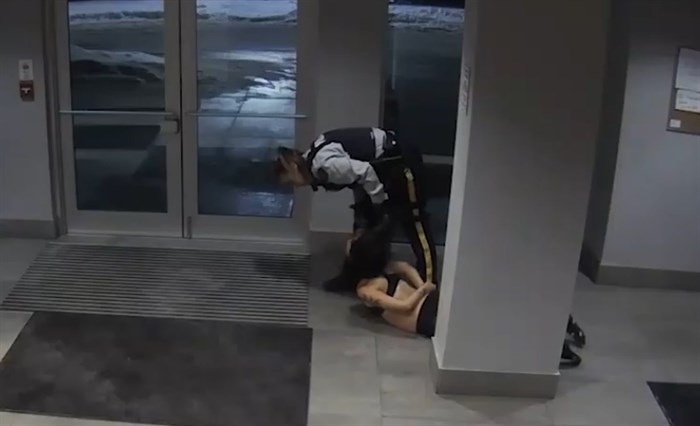
RCMP Const. Lacy Browning dragged UBCO student Mona Wang down a hallway after making a mental health wellness check alone.
Image Credit: YOUTUBE
July 13, 2020 - 6:00 AM
The trauma Mona Wang was put through when a RCMP officer performed a wellness check on her in January would not have happened if a different system was put in place, says Jane Thornthwaite, the B.C. Liberal critic for Mental Health and Addictions.
Wang was dragged down the hallway of her apartment complex while in handcuffs by the RCMP officer. Video of that incident surfaced recently and the officer is under investigation.
READ MORE: iN VIDEO: RCMP investigating Kelowna officer caught on video dragging nursing student
“What we should be doing is funding more of these teams of health care professionals, psychologists, nurse practitioners that have specialized in mental health and addiction, social workers,” Thornthwaite told iNFOnews.ca.
There are pilot projects on this concept underway in Vancouver, Victoria and Surrey with groups that deal with the mentally ill advocating for a major increase to this approach.
“That incident (with Wang) would not occur because you would have properly, professionally trained mental health and addictions specialists that can de-escalate the situation,” Thornthwaite said. “Sometimes, when there is violence involved, the situation just gets escalated and police intervention then becomes equally violent.”
Such teams, when necessary, take a person directly to hospital without police intervention. Now, police officers sometimes have to sit in emergency rooms for hours waiting for the person to either be admitted or released.
“It’s a total waste of resources,” Thornthwaite said.
There are some teams set up in B.C. where police officers partner with registered nurses to respond to such calls. In Kelowna there is one called the Police and Crisis Team (PACT) that Interior Health has argued is not a good use of their nurse’s time.
READ MORE: Interior Health isn't yet on board with expanding mental health teams with RCMP
Thornthwaite is also calling for an overhaul of the entire health care system so there is more of a focus on prevention rather than treatment.
Nurses should start visiting schools, if not taking up positions within the schools, to identify health, including mental health, concerns so they can be treated at a young age, she said.
Kelowna-Lake Country Liberal MLA Norm Letnick, who is his party’s health critic, told iNFOnews.ca he sent a letter to Minister of Health Adrian Dix shortly after seeing the video “asking him why we haven’t had more pairing up of nurses with our RCMP to attend to mental health calls or wellness check calls.
"My letter to the minister was asking why Interior Health had not submitted more funds to provide nursing staff to be joined with the RCMP in this program and also asked the minister to explain, if not, then why not? Do they have some other evidence that shows that the resources are better used in a different way than what the city and RCMP have been asking for so they should share that with the public so we know why Interior Health has not funded those extra positions.”
iNFOnews.ca did ask the Ministry of Health if someone there could talk about the success of various programs being used to deal with people in crisis but was told to talk to the health regions or police.
We were not able to get someone to talk about theses teams but the Vancouver Police Department did provide detailed background information on their programs.
READ MORE: Combining police with nurses for mental health calls isn't new; B.C.'s first came in 1978
For her part, Kelowna-Lake Country MP Tracy Gray said in an email that she often speaks to first responders who say they are handling more and more mental health calls.
"The operations and budgeting of police services are administrated through municipalities and provinces," she wrote. "This is why it is important for all stakeholders to be at the table to come up with the best solutions regarding operations, including wellness calls, and I understand those conversations are happening. We also know that there is more need for mental health services and addictions treatment and recovery, and I have spoken about this in the House of Commons.”
She also pointed out that standing committees that deal with things like justice, human rights and public safety are not meeting during COVID-19 and won't meet until late September.
"It is at committees where studies are commissioned, and experts and witnesses can come forth with their expertise and recommendations," she wrote.
– With files from Carli Berry
To contact a reporter for this story, email Rob Munro or call 250-808-0143 or email the editor. You can also submit photos, videos or news tips to the newsroom and be entered to win a monthly prize draw.
We welcome your comments and opinions on our stories but play nice. We won't censor or delete comments unless they contain off-topic statements or links, unnecessary vulgarity, false facts, spam or obviously fake profiles. If you have any concerns about what you see in comments, email the editor in the link above.
News from © iNFOnews, 2020